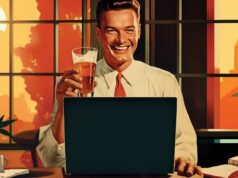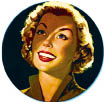 1. It shines a light in the darkness.
1. It shines a light in the darkness.
“When I need a light inside me, I walk into a pub and drink 15 pints of beer.”
—Shane MacGowan
It happens to everyone. You wake up submerged in a pitch black mood where the whole shebang seems an immense waste of time. When any and every move you could possibly make not only seems ill-advised, but a sure path to utter ruin.
Then you have a drink. You may have to force yourself to do it, because even drinking seems a big hassle. Suddenly the weight of the world shifts a little off your neck, not much, but enough to notice. Then you have another and, you know, things still suck, but it isn’t the end of the world, for crissakes. Then you have a third and a sliver of light pierces the gloom and you can actually make out the dim shapes of some of the good things around you. Six or seven more down the pipe and—Shazam!—you’re not only out of the pit of gloom, you’ve somehow managed to leap atop some gaudy and magnificent peak, surrounded by vast rolling plains of hope and opportunity.
Oh, sure, there will always be those who will shrill that it is false optimism driven by a chemical reaction in the brain, but so what? As any motivational speaker will tell you, a positive attitude, attained by whatever means, is the first step toward accomplishing anything of value.
Where there’s hooch, there’s hope.
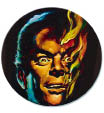 2. It inflames the imagination.
2. It inflames the imagination.
“For art to exist, for any sort of aesthetic activity to exist, a certain physiological precondition is indispensable—intoxication.”
—Friedrich Nietzsche
It’s no wonder teetotaler artists and writers are especially eager to rail against alcohol—drinking provides an unfair advantage. It’s steroids for the creative set. It not only allows you to look at something from a fresh angle, it pries open the door to the subconscious, the primordial muck from which all ideas spring.
The Roman philosopher Seneca said, “Drunkenness is nothing but voluntary madness,” and he was dead right. Applied liberally, alcohol makes you go out of your mind, and by that I mean it allows you to poke your head out of whatever mental rut you’re trudging along in. Which is important, because that ditch doesn’t offer much of a view.
Granted, some of the sheen and shine will fall off those grand ideas come morning, but a few nuggets will almost always glitter from those ink-stained cocktail napkins.
 3. It unites the tribe.
3. It unites the tribe.
“The secret of drunkenness is that it insulates us in thought, whilst it unites us in feeling.”
—Ralph Waldo Emerson
Thanks to TV, the Internet, cell phones, telecommuting, pharmaceuticals and video games, the average person presently spends more time physically alone than in any other era in human history. It’s an irony of the times—technology brought us out of the caves and into the cities and now it’s leading us back to the caves. We’ve been reduced to hermits shouting at one another from digital windows.
Which is no way to go through life, if you ask me. Communicating with a fellow human through fiber optics and satellite signals may be convenient, but it’s a sorry substitute for face-to-face contact.
There is nothing like alcohol to get you out of your cave and into the crowd. A handful of drinks and you suddenly feel the world could well benefit from your exalted presence. It makes you want to seek out human companionship, and once found, it sheds the veils behind which we hide. Put 20 strangers in a room and serve them water, and you’ll get some strained conversation at best. Give them booze and you’ve got yourself a party. Unrestrained laughter breaks the surface tension, friendships are formed, romance is sparked.
You’ll eventually return to your cave, to be sure, but perhaps you’ll bring someone back with you.
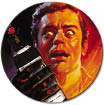 4. It makes you more human.
4. It makes you more human.
“In a world where there is a law against people ever showing their emotions, or ever releasing themselves from the grayness of their days, a drink is not a social tool. It is a thing you need in order to live.”
—Jimmy Breslin
During a typical day, the average person’s emotional pendulum swings perhaps ten degrees in either direction, from mild annoyance (spilling a cup of coffee on your desk) to mild amusement (a coworker spilling a cup of coffee in his lap). Baring your emotions, society has taught us, equates vulnerability, which is another word for weakness. We’re not only encouraged to keep our emotions off our sleeves, but buried deep inside, where they can keep our ulcers company. And there we are, glorified monkeys who learned to make machines, and now, for some inexplicable reason, we’re attempting to become those very machines.
Which is a sad state of affairs. The finest examples of humanity, all the great figures in history and legend, were men and women who roared through life with an excess of passion.
And there’s nothing like booze to fan the fires of passion that smolder within. It serves as an emotional catalyst, it gives that pendulum a shove, allowing it to swing in a broad arc. It lends you the energy and excuse to exercise the full gamut of human emotion, from righteous Moses-coming-down-the-mountain rage to deepest, purest romantic love. (And on a good evening, both within the space of five minutes.)
Sober, we are soulless robots and about as fun. Drunk, we are cavorting monkeys willing to have a good time. Which would you rather be?
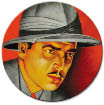 5. It’s a sure path to adventure.
5. It’s a sure path to adventure.
“It’s like gambling somehow. You go out for a night of drinking and you don’t know where you’re going to end up the next day. It could work out good or it could be disastrous. It’s like the throw of the dice.”
—Jim Morrison
Daring types once sought out adventure by setting out to the edges of civilization with loads of expedition gear. Now that the edges of civilization have overlapped, the bold must find adventure in familiar surroundings, they must eke it out of the commonplace.
For adventure to exist, two elements must be in place: risk and the courage to engage it. Alcohol provides both, in spades. Which is why the daring presently set out for the nearest bar and load up on booze.
Inebriation increases the possibility of adventure by pumping up the X Factor. No matter how well you become acquainted with the effects of drinking, there is always the possibility something unpredictable will happen, especially when you consider those around you are tempting the same fates with every lift of their glass.
Booze also lends you the necessary courage to face that inherent danger, it instills the confidence and devil-may-care attitude essential to taking that first step into the metaphorical jungle.
Now, some may decry this brand of bravery as “Dutch” or false courage, but what does it matter from which quarter courage springs? Do you think Genghis Khan gave a damn whether it was bloodlust, loyalty to his command, or a bellyful of fermented mare’s milk that encouraged his horseman to swoop down on a rival tribe?
Nowadays people crave the thrill of adventure but would prefer to do without the danger, which is ridiculous. That’s not adventure, that’s a ride at Disneyland.
Drinkers are risk takers, they’re willing to throw the dice, and don’t let modern society’s namby-pamby, play-it-safe ethos make you believe that’s a bad thing. Taking risks is what makes a life a life, as opposed to a life sentence.
 6. It’s a fool-proof escape plan.
6. It’s a fool-proof escape plan.
“Modern life is often a mechanical oppression and liquor is the only mechanical relief.”
—Ernest Hemingway
Your life is a prison. You, sir, live in a cage.
Hold on, you say. I love my life. I have a swell time! I wouldn’t trade it for anything!
Well, sure. I’m not saying it’s not a gilded cage with amenities galore, and I’m certain you’ve learned to play all sorts of delightful tunes when you artfully rattle the bars.
What I am saying is you are trapped in a prison of conformity and routine: you must go to work, you must pay your bills, you must feed your pets, you must be at certain places at certain times and if you aren’t then you’re going to have to find a new cage to live in.
The first thing getting drunk does is make you aware that you are in a cage. Fuck that job, you’ll think. It’s a fucking drag. And fuck going to your in-laws’ for Christmas, like you do every goddamn year. And you sure as hell don’t want to go to church tomorrow. Suddenly you can see the bars, and I don’t mean the ones you’re drinking in.
The second thing it does is make you forget the cage exists. You get so wrapped up in the good times everything else seems a distant blur, a vague childhood memory where nothing much happened. Drink enough and you’ll have a hard time telling the cab driver on which street your cage is situated. Whoever said alcohol won’t drown your worries didn’t fill up the bathtub with enough booze.
Of course, employing alcohol to escape reality is vilified these days. Somehow it’s a terrible thing. The bars of the cage are there to protect you, they’ll tell you. What they don’t understand is that the thing you’re trying most to escape is right there in the cage with you. Namely, you.
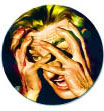 7. It makes you pay.
7. It makes you pay.
“The hangover became a part of the day as well allowed-for as the Spanish siesta.”
—F. Scott Fitzgerald
I know what you’re thinking: “Why in high hell would a rabid proponent of drinking celebrate the hangover, of all things? Hangovers are the sworn enemy of drunkardom!”
I disagree. Hangovers are good things, and here’s why:
First, they provide a balance. Every Yin must have its Yang. I know it’s hard to appreciate that when you’re Yanging over the sink the morning after, but consider this—what sort of crowd would you find in the bars if it was all good times, if there was no punishment lurking behind the pleasure? A gang of fair-weather pussyfoots is what you’d have, and who wants those types getting in the way of your next drink?
Hangovers make drunks a tougher breed of character. The hangover is the mean older brother who toughens you up and teaches you how to fight back. Don’t believe me? Tell you what—you gather the gang from Starbucks and I’ll assemble the boys from Kelly’s Pub and we’ll meet in the parking lot. The caffeine crowd won’t even manage to throw a punch, they’ll be too busy texting the cops: OMG! DRNKS TACKNG US! HLP!
Finally, and perhaps most importantly, hangovers teach the art of the rebound. It instills the idea that if you grit your teeth and fight through the pain, soon enough you’ll be able to get back up and start swinging again.
You can’t keep a drunk down. Especially once Happy Hour rolls around.
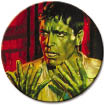 8. It imparts self awareness.
8. It imparts self awareness.
“It is most absurdly said that a man is disguised in liquor; for, on the contrary, most men are disguised by sobriety.”
—Thomas de Quincy
It’s crazy. People attend seminars, meditate, indulge in astrology, consult palm readers and take any number of personality tests, all in an attempt to figure out who they truly are. All those poor souls are walking around wondering, “Who and what am I really?” When all they need to do is get good and stinking drunk.
Nothing reveals your inner nature, to yourself and those lucky enough to be around you, like a good booze-up. Drink by drink, alcohol strips away all those carefully applied layers of deceit. It knocks loose the gaudy ornaments of pretension and affectation, finally laying bare what hides beneath.
I’m going to say it flat out: anyone who’s never been drunk doesn’t know a damn thing about themselves. All they know is the conscious voice in their head, and that voice is an expert liar. It’s only when that preacher is shoved off the podium—so the rest of the congregation can speak—that you become aware of the true dogma of the self.
Drunks have a very fine understanding of their true selves. They are keenly aware of every dimension of their psyche—they’ve sung with their angels and raged with their devils. They’ve examined that inner face from so many different angles they can render an accurate sculpture from memory, flaws and all.
Which is important, because as Plutarch preached, you cannot entirely love someone until you entirely know them.
Which brings up the next best thing about boozing.
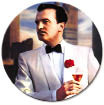 9. It allows you to believe you are a better person than you ever imagined you were.
9. It allows you to believe you are a better person than you ever imagined you were.
“When I have one martini, I feel bigger, wiser, taller. When I have the second, I feel superlative. When I have more, there’s no holding me.”
—William Faulkner
Ever notice how drunks rarely seem to mind being the center of attention? Not only don’t they mind, they practically demand it, even if it means breaking your things and yelling at the top of their lungs.
Why would this be so? Because when you’re drunk you’re certain you deserve the spotlight. You might be the shyest, most reticent mouse while sober, but load you up with enough liquor and you’re John Barrymore shouting Shakespeare, however unintelligibly.
Booze burnishes to a high gleam every quality you’re lucky enough to possess, and some you weren’t even aware you had claim to. It certainly makes you more generous—there isn’t a barista on earth that makes as much as a bartender. It elevates your sense of humor, surely—no one laughs at a bad joke like a drunk. It reveals you to be an expert dancer, deft conversationalist, brilliant philosopher, gifted singer and the most sensual of lovers. And good looking? You’re so damned handsome you’d have to beat the girls off with a stick if they weren’t so intimidated by your sheer, well, handsomeness. And tough—you’re so hard you could deck half the guys in the room with a single punch if they’d just stay still for a goddamn minute.
Alcohol lets you love yourself. And I say that’s a fine thing. Everyone should feel that way every now and then. Why must you go through life acting like an accountant or salesman or carpenter, just because that’s what you do for a living?
Why should only kings get to feel like kings?
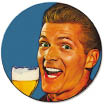 10. It brings the joy.
10. It brings the joy.
“Why on earth aren’t people continually drunk? I want ecstasy of the mind all the time.”
—Jack Kerouac
There isn’t enough joy in the world, and that’s a fact. If there was, alcohol would have been dismissed as a mere disinfectant long ago.
I know, I know—we should just get “high on life” and then we wouldn’t have to bother with the booze. And I’ve noticed that it seems to work for some people. What I’ve also noticed is those people all seem a little, well, insane.
I’m not saying there isn’t opportunity for “highness” in the sober world; I’m just saying those instances are too few and far between. Think about it–how often do you feel genuine unbridled glee while sober? Once or twice a week? You can’t count on it. You can’t expect the neighborhood kids to launch a glorious foul ball right through the living room window of your asshole neighbor every day of the week. No matter how much you pay them.
It always amuses me when I read about some hand-wringing do-gooder wondering why-oh-why do seemingly sensible people pursue alcohol with such fervor. What dark motivation, what genetic flaw must drive them? What the Drys don’t seem able to grasp is that a drinker can walk into a bar, and a handful of transactions later, attain the same level of euphoria that the teetotaler would have to strangle a half dozen or so kittens to achieve.
It’s joy on demand. Your fifth drink goes down and a sense of well-being rises up. Then, as the night reels along, the feeling expands into a real sense of euphoria. There’s nothing fake about it. It’s a three-pronged attack: you feel good because stress is released, self-image is elevated, and your inhibitions get the old heave-ho.
And what a joyful feeling it is, knowing that joy is always and only a walk to the bar away.








